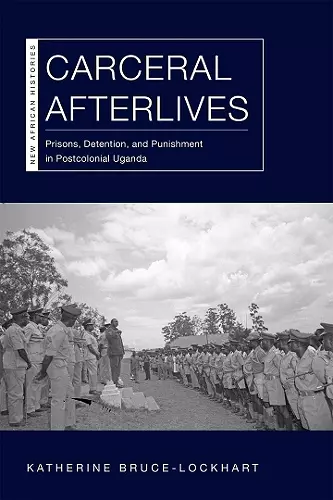Carceral Afterlives
Prisons, Detention, and Punishment in Postcolonial Uganda
Katherine Bruce-Lockhart author
Format:Paperback
Publisher:Ohio University Press
Published:5th Jul '22
Currently unavailable, and unfortunately no date known when it will be back
This paperback is available in another edition too:
- Hardback£66.00(9780821424773)

This social and political history analyzes how incarceration, a practice and policy with colonial origins, was central to both the exertion of and challenges to state power in postcolonial Uganda. The book also illustrates the persistent imbrication of prisons, punishment, politics, and struggles for decolonization and freedom across the globe.
Drawing upon social history, political history, and critical prison studies, this book analyzes how prisons and other instruments of colonial punishment endured after independence and challenges their continued existence.
In Carceral Afterlives, Katherine Bruce-Lockhart traces the politics, practices, and lived experiences of incarceration in postcolonial Uganda, focusing on the period between independence in 1962 and the beginning of Yoweri Museveni’s presidency in 1986. During these decades, Ugandans experienced multiple changes of government, widespread state violence, and war, all of which affected the government’s approach to punishment. Bruce-Lockhart analyzes the relationship between the prison system and other sites of confinement—including informal detention spaces known as “safe houses” and wartime camps—and considers other forms of punishment, such as public executions and “disappearance” by state paramilitary organizations.
Through archival and personal collections, interviews with Ugandans who lived through these decades, and a range of media sources and memoirs, Bruce-Lockhart examines how carceral systems were imagined and experienced by Ugandans held within, working for, or impacted by them. She shows how Uganda’s postcolonial leaders, especially Milton Obote and Idi Amin, attempted to harness the symbolic, material, and coercive power of prisons in the pursuit of a range of political agendas. She also examines the day-to-day realities of penal spaces and public perceptions of punishment by tracing the experiences of Ugandans who were incarcerated, their family members and friends, prison officers, and other government employees. Furthermore, she shows how the carceral arena was an important site of dissent, examining how those inside and outside of prisons and other spaces of captivity challenged the state’s violent punitive tactics.
Using Uganda as a case study, Carceral Afterlives emphasizes how prisons and the wider use of confinement—both as a punishment and as a vehicle for other modes of punishment—remain central to state power in the Global South and North. While scholars have closely analyzed the prison’s expansion through colonial rule and the rise of mass incarceration in the United States, they have largely taken for granted its postcolonial persistence. In contrast, Bruce-Lockhart demonstrates how the prison’s transition from a colonial to a postcolonial institution explains its ubiquity and reveals ways to critique and challenge its ongoing existence. The book thus explores broader questions about the unfinished work of...
“Katherine Bruce-Lockhart engages in a meticulous analysis of Africa’s postcolonial penal systems through stories of how they were imagined and experienced in Uganda by the confined, workers, and their families. Carceral Afterlives is painstakingly researched, unparalleled on many levels, and a must-read book for anyone interested in postcolonial state politics, global histories of prisons, and confinement. A trailblazer and momentous.”
“Carceral Afterlives demonstrates the centrality of prisons to postcolonial African politics. Using an array of written, oral, and visual sources and an elegant prose, Katherine Bruce-Lockhart provides a fascinating analysis of how prisons, punishment, and politics intertwined in postcolonial Uganda, where the state, whether military or civilian, conceptualized incarceration as a powerful tool for advancing its political agendas by drawing upon a strong colonial legacy of confinement, which in the process turned carceral spaces into sites of resistance and struggle. An impressive work of scholarship, this book is a welcome addition to the growing literature on African penal histories and the global history of punishment. A must-read for scholars of East African history as well.”
“This is a major contribution to the historiography of postcolonial Uganda, dealing with a topic on which historical research is long overdue. Bruce-Lockhart has provided a richly detailed and authoritative account of prisons and the experience of incarceration under Obote and Amin in particular. In so doing, the author offers new insights into the workings, as well as the dysfunction, of the Ugandan state during the early years of independence.”
“In her strikingly original book, Katherine Bruce-Lockhart explores how the early rulers of independent Uganda, who had previously denounced colonial prisons as violent and racist instruments of European imperialism, paradoxically redeployed mass detention as an integral arm of the new state. Creatively employing a variety of sources such as memoirs, letters, and journalistic reports, she also captures the voices of prisoners and their political allies who turned prisons into sites of struggle and dissent. Carceral Afterlives constitutes an important contribution to the stimulating new field of transnational prison history.”
“This important book reveals the continuities, adaptations, and negotiations of Ugandan incarceration across the colonial and postcolonial eras. Pieced together from a remarkable range of sources, including oral histories, Katherine Bruce-Lockhart conceptualises the modern prison’s symbolic and penal functions as inherently colonial by highlighting the recursive nature of its purpose, character, and experience. Meticulously researched and elegantly framed, this book sets a new agenda for understanding the historic and transnational influences that inflect incarceration in the modern age.”
- Winner of Joel Gregory Prize 2024 (United States)
ISBN: 9780821424780
Dimensions: unknown
Weight: unknown
302 pages